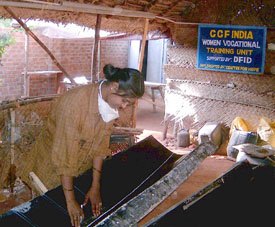Site will be
unavailable for maintenance from June. 4, 11:30 p.m., to June 5, 12:30 a.m. ET. Thank you for your
patience!
The Women Boat Builders of Kanyakumari, India
Posted on 11/07/2005
By Kirsten Hongisto, communications manager-Asia for Christian Children's Fund
At the southernmost tip of India, where the waters of the Arabian Sea, the Indian Ocean and the Bay of Bengal become one, hundreds of fishing boats would dot the tricolor waters off of Kanyakumari. But the December 26, 2004 tsunami not only took more than 800 lives there, it destroyed much of the community’s traditional fishing industry.
Recognizing the lack of skilled fiber boat builders and repairers, the women of Kanyakumari asked Christian Children’s Fund-India and its partner, the Centerfor Hope, to provide them those skills. And that’s exactly what the two organizations are now doing.
At the time of the women’s suggestion, the organizations were assessing market needs to determine which training programs they could offer. Using funds from the British government’s Department for International Development, the two partners seized the chance to provide needed skills to the community and break with tradition at the same time.
 |
A barber before the tsunami, Raveena now assists in the building and repair of fiber boats. |
The 12 women currently participating in the four-month fiber boat repair course say they know no other women in their new line of work. Ranging in age from 20 to 42 years old, the women say they “can do the work just like the men.”
All of the women were directly affected by the tsunami. While some previously ran small shops, most were not employed at all.
The Students
At the training site, women from Melathurai and Pilla Thopu villages are busy learning to measure and saw the wooden support pieces, using the mould to build a new boat and finish off the final product.
“Everyone here is a good worker,” says Lawrence Justin, a skilled carpenter who is instructing the women.
Emily and her husband both lost their shops to the tsunami.
With two children to support, and her husband still unable to find work, Emily decided to come for the training. “I like doing this work” she says.
“If I can continue this work, it will be a good life,” says Rani, a housewife before the tsunami who now must work. Her husband’s leg was paralyzed in the disaster — a lifelong fisherman, he can’t bring himself to resume fishing and is unable to find other work.
Upon completion of the training, the women will receive the tools they need to begin their new lives.
With 540 fiber boats destroyed by the tsunami and no other trained fiber boat carpenters in their area, they are hopeful about their future prospects. And they say they are glad to be supporting their husbands.
Off the picturesque coast of Kanyakumari, a handful of fishing boats can now be seen again, but many fishermen are still waiting for boats to replace the ones they lost.
When the women graduate from their program, they will be able to help not only their own families, but also their entire communities, return to life as normal.
Loading...


